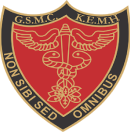
OVERVIEW
King Edward Memorial Hospital
General Information
Unique offerings
King Edward Memorial Hospital
For more information kindly connect with
The institute specializes in evaluating and treating common as well as rare genetic diseases, including chromosomal disorders, microdeletion/microduplication syndromes, skeletal dysplasias, inborn errors of metabolism, and malformation syndromes, families for prenatal counseling and prenatal diagnosis, premarital counseling, recurrent reproductive losses, disorders of sexual development and many other categories.
- Notably, KEM Hospital is at the forefront of lysosomal storage disorder treatment, providing enzyme replacement therapy for conditions like Gaucher disease, Pompe disease, and mucopolysaccharidosis types II and VI. The institute has also made significant strides in antisense oligonucleotide (ASO) therapy, specifically utilizing Nusinersen (Spinraza) to treat spinal muscular atrophy in children over the past two years.
- The hospital extends its expertise to gastrointestinal diseases such as “very early onset” inflammatory bowel disease, genetically predisposed pancreatitis, and a wide spectrum of rare conditions, including neonatal diabetes, neuroendocrine tumors, and non-malignant hematological childhood diseases like congenital dyserythropoietic anemia, Diamond-Blackfan syndrome, and coagulation factor deficiencies.
- Gastrointestinal diseases like “very early onset” inflammatory bowel disease, genetically predisposed pancreatitis, endocrine disorders like neonatal diabetes, neuroendocrine tumours and hematological non- malignant childhood diseases like congenital dyserythropoietic, Diamond Blackfan syndrome, and coagulation factor deficiencies are a few of the wide spectrum of rare diseases that the institute caters to.
DIAGNOSTICS FACILITIES
Pathology
- Hematology
- Clinical pathology
- Lipid and enzyme Biochemistry
- Arterial blood gas analysis
- Immunological tests
- surgical pathology
- Cytopathology
- Autopsy
- Cardiovascular and Thoracic laboratory
- Neuropathology Laboratory
- Immunohistochemistry Laboratory
Neuropathology
- CSF examinations & cytology
- Brain, Spinal cord lesion biopsies, Nerve and Muscle biopsy
- Intraoperative diagnosis (Frozen Section)
- Neuropathology autopsy
Autopsy
- Autopsies: Pathology + Medico-Legal Post Mortems
- Reporting of Outside medicolegal autopsies
Surgical Pathology Laboratory
- General Surgical pathology
- Surgical small biopsies
- Gastrointestinal Pathology
- Renal pathology & Kidney biopsies
- Pediatric Pathology
- Liver biopsies
- Frozen section
- Special stains
- Immunohistochemistry (IHC)
CVTC Laboratory 116
- Surgical Biopsies & Excisions
- Cardiopulmonary Autopsies
- Sputum & Other Fluid Cytology
EMS laboratory
- Hemograms
- Smears for malarial parasites
- Arterial Blood Gas
- CSF
Imaging
Conventional Radiography
- Plain radiographs
- Intravenous urography: Micturating cystourethrogram, Retrograde urethrogram, Intravenous pyelogram
- Barium Fluoroscopic studies: Barium studies (Barium swallow, Upper gastrointestinal series, Barium meal follow through, barium enema, NJ tube insertion)
- Hysterosalpingography
- Sinograms, Sialography, Ductography
Ultrasonography and Color Doppler with 3D /4D Ultrasound studies. Ultrasound facility is available 24×7 on all the days.
- Abdomen ultrasound
- Antenatal scans with fetal 2D echo and neurosonograms
- First trimester scans
- Superficial organs scans
- Various Doppler studies
- Neonatal Ultrasound
- USG guided interventions- FNACs, Biopsies, Draining procedures and Obstetrics interventions, Radiofrequency ablation
- Contrast enhanced ultrasound
- 3D and 4D studies
- Elastography
Computed TomographyThe machine is functional 24 x 7 on all days. Special days for pediatrics on Tuesday, Friday and Saturday with a pediatric anesthesia facility.
- Plain and contrast enhanced CT scans head, neck, chest, abdomen, pelvis and limbs
- Dedicated facility for Paediatric CT scans
- Virtual bronchoscopy, Tanaka index, liver volumetry
- CT intravenous urogram
- Cardiac CT and coronary angiography
- CT enteroclysis and enterography
- CT cisternography
- CT guided interventions: Bone and soft tissue biopsies, drainage procedures, Radiofrequency Ablation
Magnetic Resonance Imaging. The machine is functional 24 x 7 from Monday to Saturday. A Special day for pediatrics on Saturday with a pediatric anesthesia facility.
- Plain and contrast MRI
- Spectroscopy
- Perfusion studies
- Tractography
- Fistulogram and Defecography
- MRCP
- Functional MRI
DSA
This department is located on the first floor of the old building(No.53).
- Neuroradiology
- Vascular Interventional Radiology
Mammography
Clinical & Hematological Services
- Blood collections
- Hemograms
- Coagulation profile (BT/CT):
- Routine urine examination
- Malarial Parasites
- Platelet count
- ESR
- O. C Laboratory
- Hemograms
- ESR
- MP
- BT/CT
Clinical Pathology and Hematology
- Hemograms
- Malarial parasites
- Optimal / QDX (Malarial antigen test)
- Platelet count
- Special investigations (sickling, LE cell, Retic count, buffy coat, Microfilaria)
- Special stains for leukemia
- Bone marrow biopsies, Bone marrow Aspirate & Imprint
- Urine examination
- Fluid samples for microscopy
- ESR
CVTC Laboratory 315
- Blood Collections (OPD Wards)
- Hemograms
- Prothrombin time (PT)
- Routine body Fluid Examination
- Lipid Profile (Triglycerides) + (Cholesterol)
- Complete lipid Profile (Triglycerides) + (Cholesterol) + (HDL) + (LDL)
- Serum Amylase
- CPK
- CPK- MB
- LDH
CVTC Immunology Lab 316
- RA factor
- Cryoglobulins
- Anticardiolipin antibodies
- Antinuclear Antibodies
- Anti ds DNA antibodies
- Bronchoalveolar lavage cytology
- C3
- C4
- CRP
facilities for attendants
- Cafeteria– The department of Dietetics provides a dietetic service to all areas within the hospital and also to designated areas in the local community
- Reading room – Three Reading Rooms Open for 24 hours. Closed only on O.P.D. Holidays. Reading facility out of route library hours.
- Community Development Officers at KEM hospital facility engage in diverse patient care activities, including individual and family counseling, assessment of municipal charges, handling medico-legal cases, conducting group work, providing medical and material aid, and facilitating rehabilitation through referrals to other agencies. Annually, they assist an average of 30,963 new patients and their families.
- The supportive services include counseling, financial assistance for medical/surgical expenses, provision of nutritional supplements to those in need, and offering free lunch to deserving inpatient relations.









